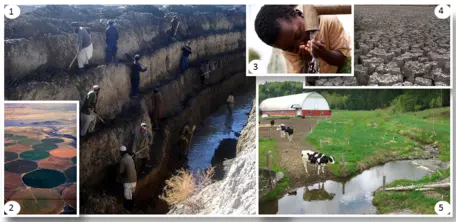Instructor Materials: Overview of the Water, Agriculture, and Sustainability Module
Summative Assessment: The overall learning goals for this module are assessed using a take-home assignment. In this assignment, students are challenged to evaluate the relative sustainability of agricultural water use in Illinois vs. California given data on water resource availability, agricultural water use, and agricultural productivity for both states.

Introduction
The Water, Agriculture and Sustainability module exists to engage students with the greatest fundamental challenges facing humanity--specifically how can we provide access to clean water to all people while also growing the food we need, fostering greater social justice, and preserving natural ecosystems? Because everyone grasps the importance of these issues, student investment in the module is high, particularly as it drives home how we are all connected to issues of water scarcity, accessibility and quality. Another strength of the module is how it features many student-centered, active learning pedagogies, again improving student engagement.
The Water, Agriculture and Sustainability module consists of 5 units as outlined below. The 5 units are designed to take place over 11 one-hour class sessions. The module could be easily reorganized to work in a course with separate lecture and lab sessions. Each module features of a set of readings, in class discussions, and in-class group work activities designed to enhance student engagement with the material and concepts. Units 1 and 2 also include online discussion prompts and homework assignments.
The module would work especially well if the instructor first sets it up by engaging their students in learning about the hydrologic cycle, watersheds, and how drinking water is supplied and wastewater is treated. Instructors are also encouraged to present examples of sustainability in water use after the module is completed.
Unit 1 What is Sustainability in the Context of Water?
In Unit 1, students learn about the essential concepts of sustainability and consider water resource-management objectives through the lens of sustainability.
Unit 2 Water Footprints
In Unit 2, students explore how much water goes into common commodities and will calculate their own water footprints.
Unit 3 Crops and Irrigation Patterns in the United States
In Unit 3, students quantitatively assess how much water is used for irrigating crops and how this varies over spatial scales within the United States. They also consider the accuracy of the water footprint calculators discussed in Unit 2.
Unit 4 Irrigation and Groundwater Mining
In Unit 4, students compare and contrast groundwater well levels in six states and use satellite imagery of the well locations to link groundwater levels to the presence of irrigated crops. The unit aims to demonstrate the unsustainability of groundwater use for agriculture in the central and western United States.
Unit 5 Agriculture and Freshwater Pollution
In Unit 5, students explore how agricultural practices can affect the quality of water resources, with particular focus on nutrient runoff and resulting eutrophication and hypoxia of water bodies.
Making the Module Work
To adapt all or part of the Water, Agriculture, and Sustainability module for your classroom, you will also want to read through
- Instructor Stories, which details how the Water, Agriculture, and Sustainability module was adapted for use at multiple institutions, as well as links to related webinars.
- Adapting InTeGrate Modules and Courses for Your Classroom, which outlines how to effectively use InTeGrate modules and courses.




